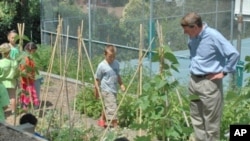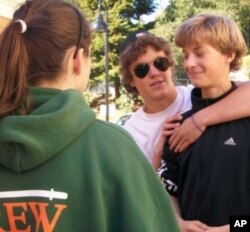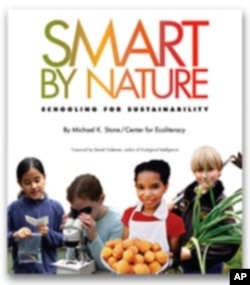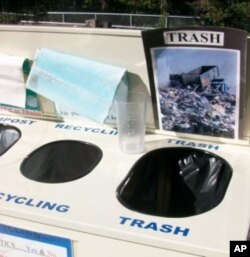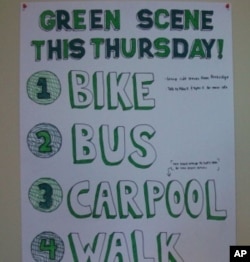Head-Royce School, a small private academy for students in kindergarten through the 12th grade in Oakland, California, prides itself on strong academic performance as well as leadership skills.
As part of that leadership experience, senior Tyler Finney gets together with other students and school staff to talk about "greening" their school. "Every day we meet to discuss how to lower emissions," he says, adding that they also plan events to get other students excited about sustainability.
Getting involved from the ground up
Green Team member Mike Eidlin, also a senior, says they're drafting a letter to parents about why they should carpool and how to buy greener products for their kids. "If we can influence our parents, the generation before us," he says, "they could help out other people who aren't as informed."
Head-Royce principal Paul Chapman says the Green Team has his full support. He believes sustainability is so important that when students first requested this project three years ago, he made sure they would have a major say in generating ideas and taking action.
"I told this group there was a reason for that, because it was about their future not our past," says Chapman. "And I wanted to make it apparent that the kids should have some power. The point was that we wanted them to get out and make change, which they did."
Chapman encouraged them to think creatively, even if some of the projects they came up with seemed fanciful and some didn't work out. Thanks to the students' ingenuity, many of their ideas have paid off. The school now gets much of its electric power from solar panels and has a garden for healthy classroom snacks.
The Green Team's efforts have also reduced the amount of trash the school generates. Senior Lydia Glenn-Murray says the committee members are trying to reduce it even more through a trash audit. "Next week, we'll be sorting through all our trash and figuring out how much of our trash should be in compost that's not and is going into the landfill." She says that, in Oakland, 30 percent of the trash in the landfill is actually compostable.
A nationwide movement
Green schools are sprouting up in all shapes and sizes across the United States, according to Lisa Bennett of the Center for Ecoliteracy, in Berkeley, California. "Some schools are doing it through gardens, some are doing it through healthy nutritious lunches, others are doing it through their classes."
The Center for Ecoliteracy has worked with Head-Royce and other schools to integrate environmental action into lesson plans and offers workshops for educators around the world. A new book from the center, called Smart by Nature, profiles U.S. schools that are greening their curriculum.
Bennett says it's important for schools to teach sustainability. "Many of the problems that we now face are because we didn't learn about sustainable living so why not start teaching young kids about it?"
Some educators oppose adding environmental projects to the school day. They are concerned it will distract from basic academics like reading and math. But Bennett says the opposite is usually true. "What the research is now showing is that when kids are out in nature and they're met with a challenge, when they're given this kind of education that's designed around a project, where they then have to learn things for a reason in order to complete their project, they are willing to work a lot harder and we have seen scores go up."
Environmental challenges foster leadership, problem-solving skills
The environmental focus at Head-Royce has made a positive difference. One Green Team member says, "It's really cool for once, rather than just learning material, to be able to build material out of our passions and out of our creativity because that's something that's not always emphasized enough."
Headmaster Chapman says that, in addition to supporting academic growth, the green mission at Head-Royce helps students build leadership skills. He points out the connection between that and real world problem solving. "When you pitch a problem to kids and let them understand that they could come up with a solution to a problem that has bedeviled other people, it's highly motivational."
You can see the motivation throughout the school, says Head-Royce Academic Dean Crystal Land. She explains that teachers incorporate the idea of sustainability into every subject at every grade level. "Our math classes have a great water-use project where they measure the amount of water that comes out of the shower in each of their homes and then compare to local water use and worldwide water use rates for other families. All through the lower school they study the ocean."
Future goals at Head-Royce include reducing the school's carbon footprint down from 2,000 metric tons of C02 a year to zero, in hopes of becoming one of the first carbon-neutral schools in the nation. Headmaster Chapman says the students are figuring out how to make that happen. He says they've discussed ideas such as running educational or fund-raising campaigns as well as encouraging carpooling and other alternative transportation.
As for the future of the Green Team students, many plan to keep trying to make the world more sustainable. "There are a lot of colleges out there that have wind turbines and they have composting set up," one young woman points out. "But I'm definitely going to get involved in whatever college I go to, in helping further green their school."




